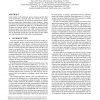110
click to vote
ISQED
2007
IEEE
15 years 7 months ago
2007
IEEE
Clock distribution is one of the key limiting factors in any high speed, sub-100nm VLSI design. Unwanted clock skews, caused by variation effects like manufacturing variations, po...
137
Voted
ISVLSI
2008
IEEE
15 years 7 months ago
2008
IEEE
As integrated circuits are scaled down it becomes difficult to maintain uniformity in process parameters across each individual die. The resulting performance variation requires ...
80
Voted
ISQED
2008
IEEE
15 years 7 months ago
2008
IEEE
Influence of manufacturing variability on circuit performance has been increasing because of finer manufacturing process and lowered supply voltage. In this paper, we focus on m...
86
Voted
FOCS
2008
IEEE
15 years 7 months ago
2008
IEEE
We present a distributed clock synchronization algorithm that guarantees an exponentially improved bound of O(log D) on the clock skew between neighboring nodes in any graph G of ...
94
Voted
DATE
2009
IEEE
15 years 7 months ago
2009
IEEE
NBTI (Negative Bias Temperature Instability) has emerged as the dominant PMOS device failure mechanism for sub100nm VLSI designs. There is little research to quantify its impact o...
73
Voted
ISPD
2010
ACM
15 years 7 months ago
2010
ACM
NBTI (Negative Bias Temperature Instability) has emerged as the dominant failure mechanism for PMOS in nanometer IC designs. However, its impact on one of the most important compo...
91
Voted
ICCAD
2003
IEEE
15 years 9 months ago
2003
IEEE
Under modern VLSI technology, process variations greatly affect circuit performance, especially clock skew which is very timing sensitive. Unwanted skew due to process variation f...
ICCAD
2006
IEEE
15 years 9 months ago
2006
IEEE
We present a fast and efficient combinatorial algorithm to simultaneously identify the candidate locations as well as the sizes of the buffers driving a clock mesh. Due to the hi...

